| Listing 1 - 10 of 27 | << page >> |
Sort by
|
Book
ISBN: 9789004375833 9789004375840 Year: 2018 Publisher: Leiden Brill
Abstract | Keywords | Export | Availability | Bookmark
 Loading...
Loading...Choose an application
- Reference Manager
- EndNote
- RefWorks (Direct export to RefWorks)
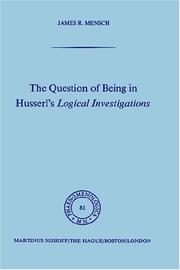
ISBN: 9024724139 9048182646 9401734461 9789024724130 Year: 1981 Volume: 81 Publisher: The Hague: Nijhoff,
Abstract | Keywords | Export | Availability | Bookmark
 Loading...
Loading...Choose an application
- Reference Manager
- EndNote
- RefWorks (Direct export to RefWorks)
This study proposes a double thesis. The first concerns the Logische Untersuchungen itself. We will attempt to show that its statements about the nature of being are inconsistent and that this inconsis tency is responsible for the failure of this work. The second con cerns the Logische Untersuchungen's relation to the Ideen. The latter, we propose, is a response to the failure of the Logische Untersuchungen's ontology. It can thus be understood in terms of a shift in the ontology of the Logische Untersuchungen, a shift motivated by the attempt to overcome the contradictory assertions of the Logische Untersuchungen. In this sense our thesis is that, in the technical meaning that Husserl gives the term, the Logische Untersuchungen and the Ideen can be linked via a "motivated path. " We can, by way of an introduction, clarify our theses by regard ing three elements. The first is the relation of epistemology to ontology. The second is the notion of motivation as Husserl conceives the term. The third is the fundamental distinctions that are to be explained via the notion of motivation. 1. We should begin by remarking that the goal of the Logische Untersuchungen is explicitly epistemological; it is that of answer ing "the cardinal question of epistemology, the question concerning the objectivity of knowledge" (LU, Tub. ed. , I, 8; F. , p. 56V For Husserl, his other questions - i. e.
Metaphysics --- Husserl, Edmund --- Philosophy, German --- Logic --- Knowledge, Theory of --- Phenomenology --- Ontology --- Philosophie allemande --- Logique --- Théorie de la connaissance --- Phénoménologie --- Ontologie --- History --- Histoire --- Husserl, Edmund, --- 111.1 --- Academic collection --- Philosophy, Modern --- Epistemology --- Theory of knowledge --- Philosophy --- Psychology --- Argumentation --- Deduction (Logic) --- Deductive logic --- Dialectic (Logic) --- Logic, Deductive --- Intellect --- Science --- Reasoning --- Thought and thinking --- Metafysica: zijnsbegrip; ontologie:--algemeen --- Methodology --- Knowledge, Theory of. --- Logic. --- Phenomenology. --- 111.1 Metafysica: zijnsbegrip; ontologie:--algemeen --- Théorie de la connaissance --- Phénoménologie --- Husserl, Edmond --- Husserl, Edmund, - 1859-1938 - Logische Untersuchungen --- Ontology.
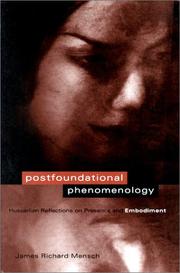
ISBN: 0271020474 9780271020471 Year: 2001 Publisher: University Park (Pa.): Pennsylvania state university press,
Abstract | Keywords | Export | Availability | Bookmark
 Loading...
Loading...Choose an application
- Reference Manager
- EndNote
- RefWorks (Direct export to RefWorks)
Theory of knowledge --- Husserl, Edmund --- Body, Human (Philosophy) --- Self (Philosophy) --- History --- -Self (Philosophy) --- -Philosophy --- Philosophy --- -History --- -Husserl, Edmund --- -Contributions in philosophy of experience --- -Body, Human (Philosophy) --- Husserl, Edmond --- Contributions in philosophy of experience --- Human body (Philosophy) --- Husserl, Edmund, --- Body, Human (Philosophy) - History - 20th century. --- Self (Philosophy) - History - 20th century.
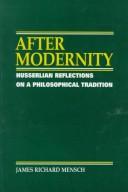
ISBN: 0791429865 9780791429860 Year: 1996 Publisher: Albany: State university of New York press,
Abstract | Keywords | Export | Availability | Bookmark
 Loading...
Loading...Choose an application
- Reference Manager
- EndNote
- RefWorks (Direct export to RefWorks)
Cogito --- Contribution à la méthodologie --- Et la méthodologie --- Filosofie van het postmodernisme --- Ik (Filosofie) --- Methodologie --- Methodology --- Moi (Philosophie) --- Méthodologie --- Philosophie postmoderniste --- Postmodernism --- Postmodernisme --- Postmodernisme (esthétique) --- Postmodernisme (filosofie) --- Postmodernisme (philosophie) --- Self (Philosophy) --- Temps --- Tijd --- Time --- Time. --- Methodology. --- Postmodernism. --- Hours (Time) --- Geodetic astronomy --- Nautical astronomy --- Horology --- Philosophy --- Post-modernism --- Postmodernism (Philosophy) --- Arts, Modern --- Avant-garde (Aesthetics) --- Modernism (Art) --- Philosophy, Modern --- Post-postmodernism --- Research --- Aristotle. --- Thomas, --- Husserl, Edmund, --- Husserl, Edmund --- Husserl, Edmond --- Akʻvineli, Tʻoma, --- Akvinietis, Tomas, --- Akvinskiĭ, Foma, --- Aquinas, --- Aquinas, Thomas, --- Foma, --- Thomas Aquinas, --- Tʻoma, --- Toma, --- Tomas, --- Tomasu, --- Tomasu, Akwinasu, --- Tomasz, --- Tommaso, --- Tʻovma, --- Тома, Аквінський, --- תומאס, --- תומס, --- اكويني ، توما --- Aristoteles --- Aristote --- Aristotle --- Aristotile --- Aristoteles. --- Arisṭāṭṭil --- Aristo, --- Aristotel --- Aristotele --- Aristóteles, --- Aristòtil --- Arisṭū --- Arisṭūṭālīs --- Arisutoteresu --- Arystoteles --- Ya-li-shih-to-te --- Ya-li-ssu-to-te --- Yalishiduode --- Yalisiduode --- Ἀριστοτέλης --- Αριστοτέλης --- Аристотел --- ארסטו --- אריםטו --- אריסטו --- אריסטוטלס --- אריסטוטלוס --- אריסטוטליס --- أرسطاطاليس --- أرسططاليس --- أرسطو --- أرسطوطالس --- أرسطوطاليس --- ابن رشد --- اريسطو --- Pseudo Aristotele --- Pseudo-Aristotle --- アリストテレス --- Ākvīnās, Tūmās, --- اكويني، توما, --- آکويناس، توماس, --- Humanities Methodology
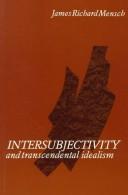
ISBN: 0887067522 9780887067525 Year: 1988 Publisher: Albany: State university of New York press,
Abstract | Keywords | Export | Availability | Bookmark
 Loading...
Loading...Choose an application
- Reference Manager
- EndNote
- RefWorks (Direct export to RefWorks)
Intersubjectivity --- Idealism --- Idealism. --- Intersubjectivity. --- Ontology --- Phenomenology --- Social psychology --- Subjectivity --- Animism --- Monism --- Personalism --- Philosophy --- Positivism --- Dualism --- Materialism --- Realism --- Transcendentalism --- Husserl, Edmund, --- Husserl, Edmund --- Husserl, Edmond
Book
ISBN: 9780810130548 0810130548 Year: 2015 Publisher: Evanston, Ill.: Northwestern university press,
Abstract | Keywords | Export | Availability | Bookmark
 Loading...
Loading...Choose an application
- Reference Manager
- EndNote
- RefWorks (Direct export to RefWorks)
By virtue of the originality and depth of its thought, Emmanuel Levinas's masterpiece, Totality and Infinity: An Essay on Exteriority, is destined to endure as one of the great works of philosophy. It is an essential text for understanding Levinas's discussion of "the Other," yet it is known as a "difficult" book. Modeled after Norman Kemp Smith's commentary on Kant's Critique of Pure Reason, Levinas's Existential Analytic guides both new and experienced readers through Levinas's text. James R. Mensch explicates Levinas's arguments and shows their historical referents, particularly with regard to Heidegger, Husserl, and Derrida. Students using this book alongside Totality and Infinity will be able to follow its arguments and grasp the subtle phenomenological analyses that fill it
Book
ISBN: 9780874628012 0874628016 Year: 2010 Volume: 70 Publisher: Milwaukee ( Wis.): Marquette university press,
Abstract | Keywords | Export | Availability | Bookmark
 Loading...
Loading...Choose an application
- Reference Manager
- EndNote
- RefWorks (Direct export to RefWorks)
Having asked, What, then, is time? Augustine admitted, I know well enough what it is, provided that nobody asks me; but if I am asked what it is and try to explain, I am baffled. We all have a sense of time, but the description and explanation of it remain remarkably elusive. Through a series of detailed descriptions, Husserl attempted to clarify this sense of time. This book traces the development of his account of our temporal self-awareness, starting with his early 1905-1909 lectures on time consciousness and proceeding through the 1917-18 Bernau Manuscripts, the Analyses of Passive Syntheses of the 1920s and ending with the C, B and E manuscripts on time and instincts of the 1930s. Although it covers all the stages of Husserls account of temporality, the book is nonetheless systematic in its approach. It is organized about a number of basic topics in the theory of time and presents and critically appraises Husserls positions on the issues pertaining to each.
Time perception --- Husserl, Edmund, --- Chronometry, Mental --- Duration, Intuition of --- Intuition of duration --- Mental chronometry --- Time --- Time, Cognition of --- Time estimation --- Orientation (Psychology) --- Perception --- Husserl, Edmund --- Husserl, Edmond --- Husserl, Edmund, - 1859-1938
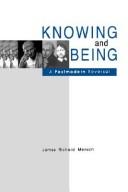
ISBN: 0271015551 Year: 1996 Publisher: University Park Pennsylvania State University Press
Abstract | Keywords | Export | Availability | Bookmark
 Loading...
Loading...Choose an application
- Reference Manager
- EndNote
- RefWorks (Direct export to RefWorks)
Subjectivity --- Knowledge [Theory of ] --- Knowledge, Theory of --- Object (Philosophy) --- Postmodernism --- Subjectivism --- Post-modernism --- Postmodernism (Philosophy) --- Epistemology --- Theory of knowledge --- Relativity --- Arts, Modern --- Avant-garde (Aesthetics) --- Modernism (Art) --- Philosophy, Modern --- Post-postmodernism --- Philosophy --- Psychology
Book
ISBN: 9780810125612 9780810125605 0810125617 Year: 2009 Publisher: Evanston, Ill.: Northwestern university press,
Abstract | Keywords | Export | Availability | Bookmark
 Loading...
Loading...Choose an application
- Reference Manager
- EndNote
- RefWorks (Direct export to RefWorks)
Human body --- Liberty --- Political science --- Sovereignty --- State sovereignty (International relations) --- International law --- Common heritage of mankind (International law) --- International relations --- Self-determination, National --- Political philosophy --- Civil liberty --- Emancipation --- Freedom --- Liberation --- Personal liberty --- Democracy --- Natural law --- Equality --- Libertarianism --- Social control --- Political aspects --- Philosophy --- Law and legislation
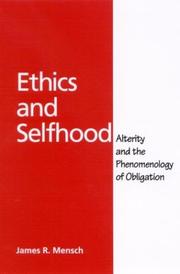
ISBN: 0791486699 1417531363 9781417531363 0791457516 9780791457511 0791457524 9780791457528 9780791486696 Year: 2003 Publisher: Albany, NY State University of New York Press
Abstract | Keywords | Export | Availability | Bookmark
 Loading...
Loading...Choose an application
- Reference Manager
- EndNote
- RefWorks (Direct export to RefWorks)
According to James R. Mensch, a minimal requirement for ethics is that of guarding against genocide. In deciding which races are to live and which to die, genocide takes up a standpoint outside of humanity. To guard against this, Mensch argues that we must attain the critical distance required for ethical judgment without assuming a superhuman position. His description of how to attain this distance constitutes a genuinely new reading of the possibility of a phenomenological ethics, one that involves reassessing what it means to be a self. Selfhood, according to Mensch, involves both embodiment and the self-separation brought about by our encounter with others—the very others who provide us with the experiential context needed for moral judgment. Buttressing his position with documented accounts of those who hid Jews during the Holocaust, Mensch shows how the self-separation that occurs in empathy opens the space within which moral judgment can occur and obligation can find its expression. He includes a reading of the major moral philosophers—Plato, Aristotle, Kant, Mill, Arendt, Levinas—even as he develops a phenomenological account of the necessity of reading literature to understand the full extent of ethical responsibility. Mensch's work offers an original and provocative approach to a topic of fundamental importance.
Other (Philosophy) --- Self (Philosophy) --- Phenomenology. --- Ethics. --- Alterity (Philosophy) --- Otherness (Philosophy) --- Philosophy --- Philosophy, Modern --- Deontology --- Ethics, Primitive --- Ethology --- Moral philosophy --- Morality --- Morals --- Philosophy, Moral --- Science, Moral --- Values --- Ethics --- Phenomenology
| Listing 1 - 10 of 27 | << page >> |
Sort by
|

 Search
Search Feedback
Feedback About UniCat
About UniCat  Help
Help News
News